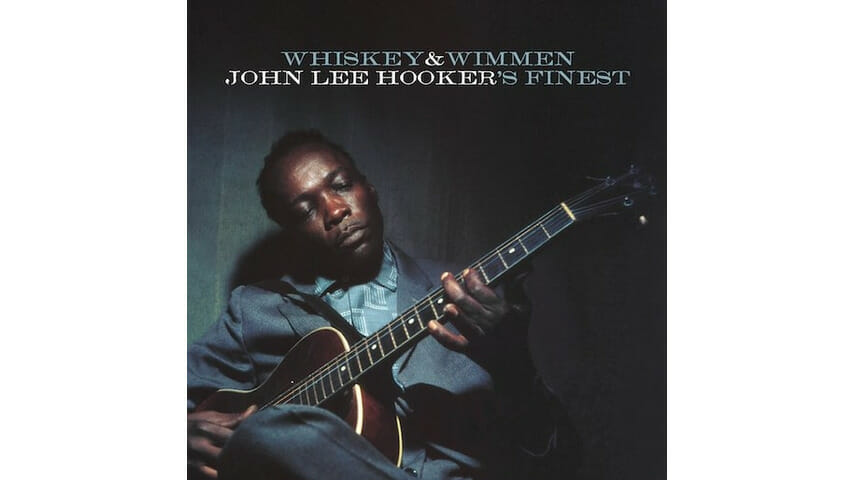It’s not actually clear when bluesman John Lee Hooker was born. He claimed
1917, but according to the Mississippi Blues Commission, census records from the area near Tutwiler, Miss. where was supposedly born, indicate he was several years older.
No matter. The truth—in regard to the blues, anyway—has always been relative. And if the man himself said 1917, then this is the year in which we’ll celebrate his centennial.
Whiskey & Wimmen: John Lee Hooker’s Finest, a new 16-track compilation from Vee-Jay, does just that. Vee-Jay was just one of many record labels that Hooker worked with over his multi-decade career, and this collection—primarily focusing on his most prolific period in the 1950s and ‘60s—includes songs originally released on three other labels, as well.
Compilation CDs of Hooker’s work have been released by the dozens since the ‘90s, and in some ways, this one is no different: it highlights the work of the bluesman who went on to influence the future of rock ‘n’ roll—The Rolling Stones, The Yardbirds, The Animals, Bonnie Raitt, Santana and George Thorogood, to name a few.
Hooker’s oft-imitated style didn’t necessarily reflect his roots, though. Tutwiler, near Clarksdale, Miss., is the land of Hill Country Blues—where the slow crawling guitar melodies meander up and down guitar necks like North Mississippi’s dirt roads. Instead of continuing this tradition, Hooker mastered the 12-bar blues that fit as well on the Ford factory lines he worked on in Detroit, as well as rural Mississippi. His incessant foot-stomping and tempo-fluctuating tendencies while performing live earned him the title the King of the Boogie.
The first three tracks on Whiskey & Wimmen, showcase this famous boogie with up-tempo selections like “Boom Boom,” “Boogie Chillun” that sold a million copies as a single in 1948, and “Dimples.” Other songs on this compilation like “It Serves Me Right” slow it down, though, which serve to teach the kiddos the roots of the term, “bummer jam.” Additionally, while Hooker was known for helping pioneer the electric blues, he actually began playing on an acoustic, and numbers like “I Need Some Money” and “No More Doggin’’ help illustrate those beginnings.
As for the liner notes of this new compilation, music journalist Bill Dahl contributed new text describing Hooker’s history, music, and influence that fills a chunk of the vinyl gatefold. But having written about the legend elsewhere, similar bio copy by Dahl is readily available online at Billboard and Rovi, which is a bit disappointing, As a positive, the detailed notes on each song feature information on its original label, album name or single number and recording location, in addition to standard information on the players and writers.
The most curious aspect of Whiskey & Wimmen is its title and subsequent thematic framing. While the sentiment remains timeless (society’s vices and an individual’s relationship struggles, even if the gendering reflects less woke times), it’s interesting that Vee-Jay chose to name this record as it did.
Hooker’s personal life was far less documented than, say, Chuck Berry’s, who received numerous think pieces about the effects of his troubled personal life versus his musical legacy after his recent passing. Charles Shaar Murray includes a passing mention of the word “womanizing” in his biography Boogie Man: The Adventures of John Lee Hooker in the American Twentieth Century, which was published in 2000. And even earlier than that, a 1997 article in Spokane, Wash.’s Spokesman Review, claims that Hooker didn’t drink as much as his contemporaries, but, “Rumors of his womanizing are not over-exaggerated.” That description was backed up with a quote from Hooker saying, “I love flirting. It’s fun.”
While we may not know exactly how much Hooker may have indulged in the titular vices outside of the songs featured here, distilling an album that’s supposed to celebrate his musical legacy to a colloquialism like “booze ‘n’ bitches” seems diminishing and superficial. The compilation—and Hooker’s storied career—could have just as easily been summarized with other song titles like “Time Is Marching” (especially considering this centennial). Even putting criticisms on the packaging, titling and liner notes aside, John Lee Hooker’s music stands the test of time. The tunes in this collection of his foundational blues are essential listening for new listeners and familiar fans, alike.
